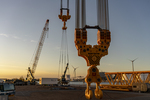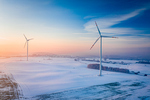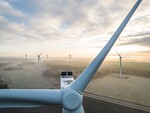11/18/2004
More efficient vertical wind turbines developed
Researchers in the USA have helped to fashion a wind turbine that can provide power at a more efficient rate, with lower noise and maintenance as well as fewer bird fatalities as compared to traditional windmills. This month, researchers involved in the project collaborated with engineers in Russia, who have been working to erect 1-kilowatt and 3-kilowatt wind turbines in barren locations. The vertical turbine blades spin at about twice the speed of the wind, much lower than the tip speeds of horizontal turbine blades. The faster tip speed makes the blade both noisy and dangerous to birds—many species of birds are being killed by wind farms, leading land stakeholders to find a solution.
“The blades travel at roughly 40 mph in a 20 mph wind, so if the blades are made plainly visible, birds should be able to see and avoid the blades most of the time,” said Glen Dahlbacka, researcher in the Department of Energy at the Lawrence Berkeley National Laboratory. Dahlbacka and fellow researcher Joseph Rasson travelled to Russia to inspect the 3-kilowatt turbine unit. Infrequent high storm winds cause the blades to spin faster than researchers intend, so the turbines are shut down on storm days. The vertical turbine system has an alternator designed to spin at the speed of the turbine and generate about 200 volts of energy. The alternator and turbine are a single moving part of the system and lead to reduced maintenance requirements. A computer controls the speed of the turbine and keeps it operating at a maximum efficiency for a given wind speed.
The researchers are expecting success and they believe the Russian market alone will guarantee this. Projects are also being conducted in Khazistan, Armenia, Ukraine and Georgia, and all have a U.S. industrial partner involved. Empire Magnets will attempt to commercialise the wind turbines in the United States and in California and New York especially, as these states, according to Dahlbacka, have good rebate and tax structures for renewable energy. The researchers are expecting the first windmills to arrive in February and March. “The city of Berkeley has even offered a site for a demonstration wind turbine near the Marina. Around the Bay Area the environmental conditions are among the most favourable you can imagine.” Dahlbacka said. The windmills are also convenient because they are suitable for both residential and ranch areas. Since Russia has a lot of remote open space that can be used for wind power generation, there have been many requests from people who live in Russian country houses or villas, called dachas.
“The 1-kilowatt wind turbine is very good for nomadic cultures because it is designed to be disassembled and put in the trunk of a car or equivalent space and taken from place to place,” Dahlbacka said. In the next year researchers plan to field 30 of the units in environments from Siberia to the Altai Mountains and from British Columbia to the Mohave to test the systems in extreme conditions of wind, temperature and precipitation.
“The blades travel at roughly 40 mph in a 20 mph wind, so if the blades are made plainly visible, birds should be able to see and avoid the blades most of the time,” said Glen Dahlbacka, researcher in the Department of Energy at the Lawrence Berkeley National Laboratory. Dahlbacka and fellow researcher Joseph Rasson travelled to Russia to inspect the 3-kilowatt turbine unit. Infrequent high storm winds cause the blades to spin faster than researchers intend, so the turbines are shut down on storm days. The vertical turbine system has an alternator designed to spin at the speed of the turbine and generate about 200 volts of energy. The alternator and turbine are a single moving part of the system and lead to reduced maintenance requirements. A computer controls the speed of the turbine and keeps it operating at a maximum efficiency for a given wind speed.
The researchers are expecting success and they believe the Russian market alone will guarantee this. Projects are also being conducted in Khazistan, Armenia, Ukraine and Georgia, and all have a U.S. industrial partner involved. Empire Magnets will attempt to commercialise the wind turbines in the United States and in California and New York especially, as these states, according to Dahlbacka, have good rebate and tax structures for renewable energy. The researchers are expecting the first windmills to arrive in February and March. “The city of Berkeley has even offered a site for a demonstration wind turbine near the Marina. Around the Bay Area the environmental conditions are among the most favourable you can imagine.” Dahlbacka said. The windmills are also convenient because they are suitable for both residential and ranch areas. Since Russia has a lot of remote open space that can be used for wind power generation, there have been many requests from people who live in Russian country houses or villas, called dachas.
“The 1-kilowatt wind turbine is very good for nomadic cultures because it is designed to be disassembled and put in the trunk of a car or equivalent space and taken from place to place,” Dahlbacka said. In the next year researchers plan to field 30 of the units in environments from Siberia to the Altai Mountains and from British Columbia to the Mohave to test the systems in extreme conditions of wind, temperature and precipitation.
- Source:
- Online editorial www.windfair.net
- Author:
- Trevor Sievert, Online Editorial Journalist
- Email:
- press@windfair.net
- Keywords:
- USA, vertical wind turbine, wind energy, wind power, wind farm, offshore, onshore


























